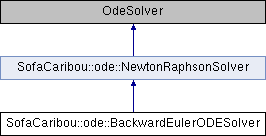Detailed Description
Implementation of an implicit backward euler solver compatible with non-linear materials.
We are trying to solve to following
![]()
Where ![]() is the mass matrix,
is the mass matrix, ![]() is the damping matrix,
is the damping matrix, ![]() is the (possibly non-linear) internal elastic force residual and
is the (possibly non-linear) internal elastic force residual and ![]() is the external force vector (for example, gravitation force or surface traction).
is the external force vector (for example, gravitation force or surface traction).
We first transform this second-order differential equation to a first one by introducing two independant variables:
![]()
Using the backward Euler scheme, we pose the following approximations:
![]()
where ![]() is the delta time between the steps
is the delta time between the steps ![]() and
and ![]() .
.
Substituting ![]() inside
inside ![]() gives
gives
![]()
And the problem becomes:
![]()
where ![]() is the vector of unknown accelerations.
is the vector of unknown accelerations.
Finally, assuming ![]() is non-linear in
is non-linear in ![]() , we iteratively solve for
, we iteratively solve for ![]() using the Newton-Raphson method and using the previous approximations to back propagate it inside the velocity and position vectors.
using the Newton-Raphson method and using the previous approximations to back propagate it inside the velocity and position vectors.
Let ![]() be the Newton iteration number for a given time step
be the Newton iteration number for a given time step ![]() , we pose
, we pose
![\begin{align*} \vect{F}(\vect{a}_{n+1}^i) &= \mat{M} \vect{a}_{n+1}^i + \mat{C} \left[ \vect{v}_{n} + h \vect{a}_{n+1}^i \right] + \vect{R}(\vect{x}_{n} + h \vect{v}_{n} + h^2 \vect{a}_{n+1}^i) - \vect{P}_n \\ \mat{J} = \frac{\partial \vect{F}}{\partial \vect{a}_{n+1}} \bigg\rvert_{\vect{a}_{n+1}^i} &= \mat{M} + h \mat{C} + h^2 \mat{K}(\vect{a}_{n+1}^i) \end{align*}](form_33.png)
where ![]() and
and ![]() are the position and velocity vectors at the beginning of the time step, respectively, and remains constant throughout the Newton iterations.
are the position and velocity vectors at the beginning of the time step, respectively, and remains constant throughout the Newton iterations.
We then solve for ![]() with
with
![\begin{align*} \mat{J} \left [ \Delta \vect{a}_{n+1}^{i+1} \right ] &= - \vect{F}(\vect{a}_{n+1}^i) \\ \vect{a}_{n+1}^{i+1} &= \vect{a}_{n+1}^{i} + \Delta \vect{a}_{n+1}^{i+1} \end{align*}](form_36.png)
And propagate back the new acceleration using ![]() and
and ![]() .
.
In addition, this component implicitly adds a Rayleigh's damping matrix ![]() . We therefore have
. We therefore have
![\begin{align*} \vect{F}(\vect{a}_{n+1}^i) &= \mat{M} \vect{a}_{n+1}^i + \mat{C} \left[ \vect{v}_{n} + h \vect{a}_{n+1}^i \right] + \vect{R}(\vect{x}_{n} + h \vect{v}_{n} + h^2 \vect{a}_{n+1}^i) - \vect{P}_n \\ &= \mat{M} \vect{a}_{n+1}^i + (\mat{C}_r+\mat{C}) \left[ \vect{v}_{n} + h \vect{a}_{n+1}^i \right] + \vect{R}(\vect{x}_{n} + h \vect{v}_{n} + h^2 \vect{a}_{n+1}^i) - \vect{P}_n \\ &= \mat{M} \vect{a}_{n+1}^i + (r_m\mat{M}+r_k\mat{K}) \left[ \vect{v}_{n} + h \vect{a}_{n+1}^i \right] + \mat{C} \left[ \vect{v}_{n} + h \vect{a}_{n+1}^i \right] + \vect{R}(\vect{x}_{n} + h \vect{v}_{n} + h^2 \vect{a}_{n+1}^i) - \vect{P}_n \\ &= \left[ (1 + hr_m)\mat{M} + h\mat{C} + hr_k\mat{K} \right] \vect{a}_{n+1}^i + \left[ r_m\mat{M} + \mat{C} + r_k \mat{K} \right] \vect{v}_n + \left[ \vect{R}(\vect{x}_{n} + h \vect{v}_{n} + h^2 \vect{a}_{n+1}^i) - \vect{P}_n \right] \\ \mat{J} = \frac{\partial \vect{F}}{\partial \vect{a}_{n+1}} \bigg\rvert_{\vect{a}_{n+1}^i} &= (1 + hr_m)\mat{M} + h \mat{C} + h(h+r_k) \mat{K}(\vect{a}_{n+1}^i) \end{align*}](form_38.png)
#include <BackwardEulerODESolver.h>

Public Types | |
| template<typename T > | |
| using | Data = sofa::core::objectmodel::Data< T > |
 Public Types inherited from SofaCaribou::ode::NewtonRaphsonSolver Public Types inherited from SofaCaribou::ode::NewtonRaphsonSolver | |
| template<typename T > | |
| using | Data = sofa::core::objectmodel::Data< T > |
| template<typename T > | |
| using | Link = sofa::core::objectmodel::SingleLink< NewtonRaphsonSolver, T, sofa::core::objectmodel::BaseLink::FLAG_STRONGLINK > |
Public Member Functions | |
| SOFA_CLASS (BackwardEulerODESolver, NewtonRaphsonSolver) | |
| void | solve (const sofa::core::ExecParams *params, SReal dt, sofa::core::MultiVecCoordId x_id, sofa::core::MultiVecDerivId v_id) override |
 Public Member Functions inherited from SofaCaribou::ode::NewtonRaphsonSolver Public Member Functions inherited from SofaCaribou::ode::NewtonRaphsonSolver | |
| SOFA_CLASS (NewtonRaphsonSolver, sofa::core::behavior::OdeSolver) | |
| void | init () override |
| void | solve (const sofa::core::ExecParams *params, SReal dt, sofa::core::MultiVecCoordId x_id, sofa::core::MultiVecDerivId v_id) override |
| auto | iteration_times () const -> const std::vector< UNSIGNED_INTEGER_TYPE > & |
| List of times (in nanoseconds) that each Newton-Raphson iteration took to compute in the last call to Solve(). | |
| auto | squared_residuals () const -> const std::vector< FLOATING_POINT_TYPE > & |
| The list of squared residual norms (||r||^2) of every newton iterations of the last solve call. | |
| auto | squared_initial_residual () const -> const FLOATING_POINT_TYPE & |
| The initial squared residual (||r0||^2) of the last solve call. | |
The documentation for this class was generated from the following files:
- /home/jnbrunet/sources/caribou/src/Plugin/Ode/BackwardEulerODESolver.h
- /home/jnbrunet/sources/caribou/src/Plugin/Ode/BackwardEulerODESolver.cpp